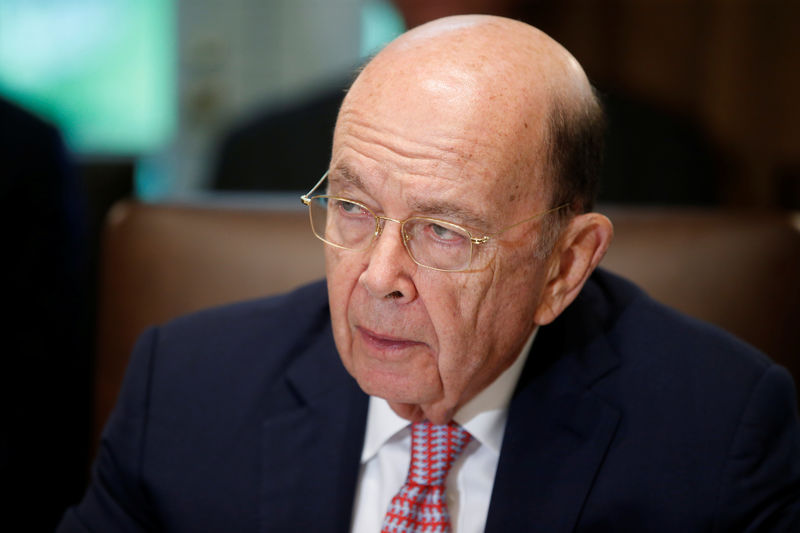By David Shepardson
WASHINGTON, Oct 1 (Reuters) - U.S. Commerce Secretary Wilbur Ross sees tens of thousands of jobs flowing back into the U.S. auto sector, especially among suppliers, thanks to the Trump administration's new trade deal with Mexico and Canada, while industry executives and analysts are less upbeat as higher costs could hurt sales.
Ross told Bloomberg TV on Monday that "the vast majority" of the 250,000 auto parts jobs lost in the United States would return under the new agreement, which is called the United States-Mexico-Canada Agreement (USMCA). The manufacturing part of U.S. auto sector employed about 950,000 people in August, according to federal data.
Ross did not say when the jobs were lost or how long it would take for some to return, but cited the deal requirements for higher regional content and higher wages by the workers making those parts. Commerce Department officials declined further comment.
U.S. President Donald Trump blamed the North American Free Trade Agreement with Mexico and Canada for the loss of manufacturing jobs because companies shifted production facilities to lower-cost Mexico.
Almost 18 percent of the world's cars were made in the three countries in 2017, making North America the third-largest auto-producing region behind China and Europe, according to industry data.
U.S. automakers, including General Motors Co (NYSE:GM) GM.N and Ford Motor (NYSE:F) Co F.N , cheered the deal, despite higher costs, because it removed the risk that the disintegration of the pact would have posed to their business model, and provides the security they need to plan investment in future multi-year projects.
Administration and industry officials said the new trade pact will require suppliers to shift some production into the United States and Canada to meet the higher requirements of 75 percent regional content - up from the previous 62.5 percent - and 40 to 45 percent of vehicle value to be built in regions paying at least $16 an hour.
Auto executives said privately they thought the rules would require a modest shift of some parts production to the United States, but would not lead to a dramatic shift in employment.
The number of U.S. auto parts assembly jobs has dropped to about 577,000 jobs from about 850,000 in 2000 due to higher levels of automation and productivity in plants and a shift to lower-cost countries like Mexico. Today's employment level is around what it was a decade ago, before the 2007-2009 financial crisis.
The crisis prompted the bankruptcies of GM and Chrysler, the closing of numerous assembly and parts plants, and the loss of tens of thousands of jobs, as well as the U.S. government's $80 billion industry bailout to prevent deeper cuts.
Automakers in the new trade deal also scored a win when pickup trucks and commercial vehicles were exempted from the new caps, which will especially benefit GM, which builds more than 400,000 trucks annually in Mexico. Fitch Ratings said the pickup exemption "is a nod to the importance of this segment to the U.S. consumer."
The deal exempts 2.6 million Mexican and 2.6 million Canadian vehicle imports to the United States from punitive 25 percent national security tariffs - significantly above existing exports, indicating there is room for those imports to grow. The deal also caps imported auto parts.
The euphoria over the deal was not confined to the U.S. auto sector. Mexican auto parts makers Nemak NEMAKA.MX and Rassini RASSNICPO.MX as well as industrial conglomerate Alfa ALFAA.MX , which also makes auto parts, all soared on the news. labor leaders with the United Auto Workers union and the AFL-CIO also welcomed the new trade pact, but said the details will determine its ultimate success. The UAW said it could "provide some needed relief for America's working families."
Not all the news is good for automakers as the deal will likely result in higher costs, industry executives and analysts said. The auto provisions will phase in through Jan. 1, 2023.
"It will drive the vehicle costs up," said Samit Ghosh, president of P3 North America, an engineering and management consulting firm with auto clients. He said that could ultimately hurt sales and thus production.
The net effect on employment, however, is not clear, Ghosh added.
In addition, the Commerce Department is studying whether imports of cars from around the world are a threat to national security. If Commerce finds that to be the case, the United States could slap tariffs on cars and parts from outside the United States, including from Canada and Mexico after the imported cars and parts covered under the USMCA deal.
The Center for Automotive Research in Michigan estimated around 200,000 jobs would be lost in the U.S. economy if the 25 percent tariffs are imposed on imported vehicles and parts from non-NAFTA trading partners, versus 715,000 jobs if imposed on all countries including Canada and Mexico.
